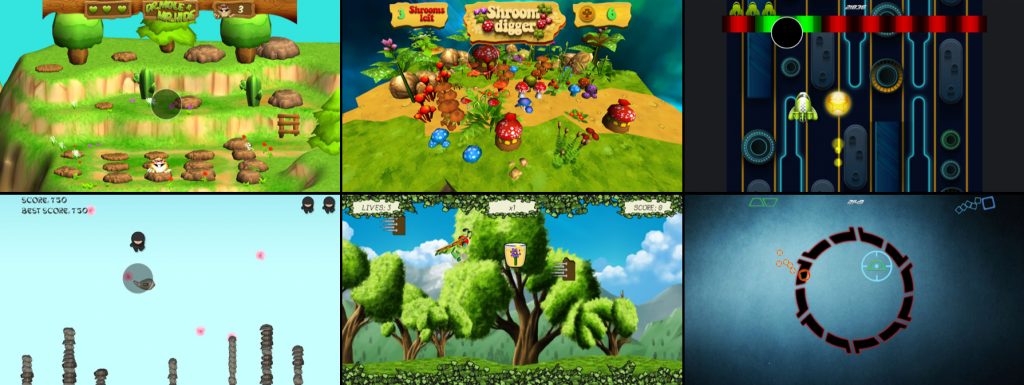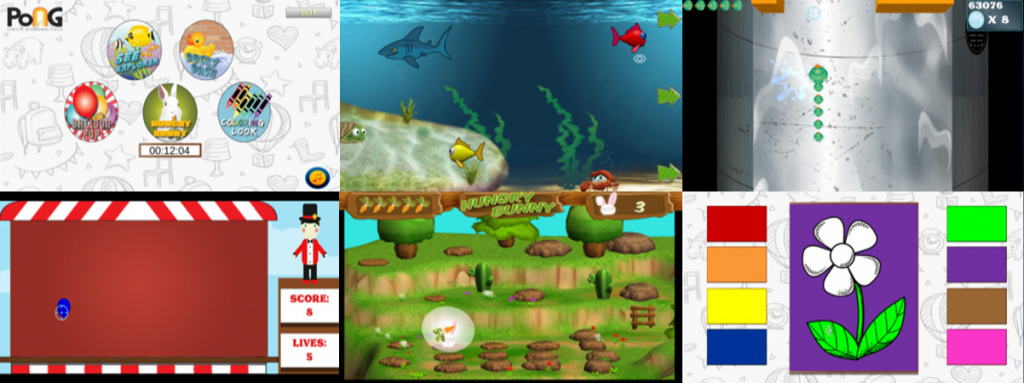We and our colleagues and others have documented persistent and specific differences in visual attention observed in individuals with autism spectrum disorders (ASD). These findings led us to propose a unique training by harnessing gaze behavior. The use of eye tracking technology combined with entertaining video games that provide visual and auditory feedback over several weeks in a home-based training environment. This work with adolescents through young adults with ASD kickstarted PoNG. We have since expanded the use of eyetracker-based training to other age groups and developmental levels.
Games for adolescents with autism (NIMH R21/R33 MH096967)
The use of eye-tracking technology compels engagement in the training of eye movements, unlike typical video games that do not explicitly require active visual feedback (Chukoskie, et al., 2018). Participant interest in retaining the games at the end of our study led us to create a way to make the games available publicly. UC San Diego’s Office of Innovation and Commercialization helped BrainLeap Technologies launch with a license of the games and related IP from our group. We are excited to see BrainLeap continue testing and advancing the training and assessment games as they make them available both through schools as well as individual families.
 Clockwise from top left: Dr. Mole & Mr. Hide, Shroom Digger, Space Race, Trapped-a-Zoid, Butterfly Bob, and Kung Fall.
Clockwise from top left: Dr. Mole & Mr. Hide, Shroom Digger, Space Race, Trapped-a-Zoid, Butterfly Bob, and Kung Fall.
Games for preschool-aged children with attention challenges
We also designed games for younger children who experience attention orienting and focus challenges but who may not have yet received a specific diagnosis. Our goal with these gaze-driven games is to improve foundational attention skills early, so children can use them effectively to succeed in social and academic situations. The development and pilot testing of these games were funded by an Accelerating Innovations to Marketplace (AIM) grant from UC San Diego.
 Clockwise from top left: Menu screen, See Explorer, Ducky Dash, Coloring Look, Hungry Bunny, and Balloon Pop.
Clockwise from top left: Menu screen, See Explorer, Ducky Dash, Coloring Look, Hungry Bunny, and Balloon Pop.
Games for older adults
Cognitive decline is a major concern for society as our population ages. Although most older adults are aging typically, they still experience a decline in cognitive function and have concerns about these declines progress into dementia. Prior research indicates two factors that may be foundational in this decline: increasing distractibility and reduced speed of processing, both of which are trainable. This set of gaze-driven games were designed specifically for aging adults and includes games for training as well as assessment, facilitating a home-based approach to gauging improvement. We are currently testing a suite of gaze-driven games in adults aged 60-80 as part of a National Institute of Aging (NIA U01 AG062371) pilot clinical trial.
 Clockwise from top left: Dirty Dodger, Vintage Vroomers, Flower Power, Seven Times Three, Menu screen, Erosion, Peaceful Pond, and Rolling Rampage.
Clockwise from top left: Dirty Dodger, Vintage Vroomers, Flower Power, Seven Times Three, Menu screen, Erosion, Peaceful Pond, and Rolling Rampage.